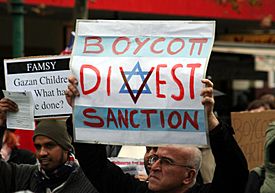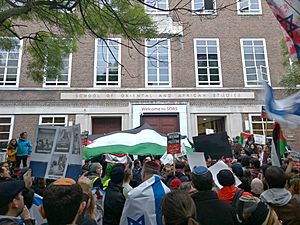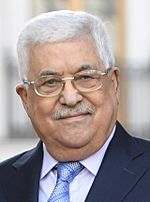Boycott, Divestment and Sanctions facts for kids
 |
|
| Abbreviation | BDS |
|---|---|
| Formation | 9 July 2005 |
| Founder | Omar Barghouti, Ramy Shaat |
| Type | Nonprofit organization |
| Purpose | Boycotts, political activism |
|
General Coordinator
|
Mahmoud Nawajaa |
|
Main organ
|
Palestinian BDS National Committee |
| Website | bdsmovement.net |
The Boycott, Divestment and Sanctions (BDS) movement is a group led by Palestinians. It uses peaceful methods like boycotts, divestments, and economic sanctions against Israel. The goal of BDS is to pressure Israel to follow international law. This includes leaving certain areas, removing a separation barrier, giving full equality to Arab citizens of Israel, and protecting the rights of Palestinian refugees to return home. The Palestinian BDS National Committee organizes and leads the movement.
BDS is inspired by the Anti-Apartheid Movement that fought against unfair laws in South Africa. Supporters of BDS compare the situation of Palestinians to that of Black South Africans during apartheid. People have held protests and meetings in many countries to support the movement. The BDS logo features Handala, a cartoon character that represents Palestinian identity and the right to return home.
Some people say the BDS movement is anti-Jewish. However, the movement denies this. They say these claims try to mix up being anti-Jewish with being against certain policies of Israel. Groups that support Israel in the United States see stopping BDS as a main goal. Since 2015, the Israeli government has spent a lot of money to say that BDS is anti-Jewish and to try to ban it in other countries. People who support BDS see it as a movement for human rights.
Contents
What is BDS?
BDS asks Israel to stop three types of unfair actions that go against international law and Palestinian rights. These are:
- Ending its control and settlement of lands taken in 1967 and taking down the Wall.
- Giving full and equal rights to Arab citizens of Israel.
- Respecting and protecting the rights of Palestinian refugees to return to their homes, as stated in UN Resolution 194.
These demands are part of a statement called the BDS Call. They are very important to the movement. Omar Barghouti, one of the founders, has said that they want all their rights, not just small acts of kindness.
BDS sees itself as a movement for all Palestinians. This includes those living in other countries and those in historical Palestine. BDS believes that talks with Israel should focus on how Palestinian rights can be given back. They also believe these talks can only happen after Israel accepts these rights.
The movement views the conflict as one between a colonizer and a colonized people. It rejects the idea that both sides are equally responsible. Because of this, BDS is against some types of talks between Israelis and Palestinians, saying they don't help.
BDS believes that past international efforts to make peace have failed. So, they think the world should put pressure on Israel. This includes using boycotts and other actions, similar to what was done against South Africa during apartheid.
BDS uses the idea of "freedom, justice, and equality." They argue that Palestinians deserve these rights like everyone else. The movement says it is against all forms of racism, including anti-Jewish hate and anti-Muslim hate. BDS sees itself as part of a larger worldwide movement. This movement works against racism, sexism, poverty, and other similar issues. BDS believes its fight for Palestinian rights is a small but important part of this bigger struggle.
How BDS Works

BDS organizes campaigns for boycotts, divestment, and sanctions against Israel.
- Boycotts mean asking people not to buy products from Israeli companies.
- Divestment means asking banks, retirement funds, and international companies to stop doing business in Israel.
- Sanctions mean pressuring governments to stop military trade and free-trade agreements with Israel. They also ask governments to suspend Israel's membership in international groups.
The Palestinian BDS National Committee chooses the main targets for boycotts. However, supporters can also choose targets that make sense for them. The committee encourages supporters to pick targets based on how much they are involved in actions that BDS considers human rights violations. They also look at how much public attention a campaign might get and how likely it is to succeed. It is also important to create campaigns that connect with issues in their own communities.
BDS Campaigns
BDS has supported many campaigns. Here are a few examples:
Derail Veolia and Alstom
Since 2008, BDS has campaigned against the French companies Veolia and Alstom. This is because they were involved in building the Jerusalem Light Rail. This train line runs through parts of East Jerusalem that Israel controls. BDS claims their boycott cost Veolia a lot of money. In 2015, Veolia sold its last investment in Israel. BDS said this was due to their campaign. However, a Veolia executive said it was a business decision.
Stop G4S
Since 2012, BDS has campaigned against G4S, a large security company. They want G4S to stop its business in Israel. Many groups supporting BDS have targeted G4S. In 2014, the Gates Foundation sold its shares in G4S. BDS activists said this was because of their campaign. G4S sold its Israeli part in 2016. But BDS still campaigns against G4S because it has a share in an Israeli police training center.
Woolworths Boycott
From 2014 to 2016, BDS South Africa led a boycott against the South African store Woolworths. This was because of its trade with Israel. This was the first big consumer boycott of a South African store since 1994. The campaign used the hashtag #BoycottWoolworths on Twitter, which became very popular. The campaign ended in mid-2016 when Woolworths said it would no longer buy Israeli products from certain areas.
Boycott HP
BDS runs a campaign against Hewlett-Packard (HP) and its related companies. They say HP helps Israel's control and actions. The campaign claims HP provides Israel with a system for ID cards that limits how Palestinians can move around. It also says HP provides servers for Israeli prisons. In 2019, a large trade union in the Netherlands and another in the UK joined the boycott against HP.
Puma Boycott
In 2018, the sports company Puma signed a deal with the Israel Football Association (IFA). The IFA includes football clubs in Israeli settlements. BDS wrote an open letter from over 200 Palestinian sports clubs asking Puma to end this sponsorship. Puma did not, so BDS started a boycott campaign called "Give Puma the Boot." In 2020, Malaysia's largest university ended its sponsorship deal with Puma.
Boycott Eurovision 2019
BDS tried to get artists to boycott the Eurovision Song Contest 2019 because it was held in Israel. BDS said Israel was using Eurovision to make its actions seem better. They also accused Israel of "pinkwashing," which means using LGBTQ+ popularity to hide other issues. No artists pulled out, but activists felt the campaign was successful because of the media attention it got.
American pop star Madonna was asked by BDS to cancel her appearance. Roger Waters also asked her to cancel, saying it made the situation seem normal. Madonna refused, saying she would not stop playing music for political reasons. She also said she would keep speaking out against human rights violations.
In September 2018, 140 artists signed a letter supporting a boycott of Eurovision. In response, over 100 celebrities, including English actor Stephen Fry, signed a statement against boycotting Eurovision in Israel. They believed that boycotts hurt both Palestinians and Israelis who are working for peace.
The band Hatari from Iceland held up Palestinian banners during the finals. This went against the rules of the event. BDS was not completely happy, saying that artists who perform in Israel cannot make up for it by doing other things to support Palestinians.
Divestment at U.S. Universities
Many universities in North America have large amounts of money invested. BDS activists on campuses have asked universities to sell their investments in companies that they say help the occupation. These campaigns often try to pass resolutions in the student government. Few universities have actually sold their investments, but activists believe these resolutions are important symbols. The discussions about divestment help more students learn about BDS.
In 2009, Hampshire College was the first U.S. college to sell its shares in companies that profit from Israel's occupation. The college president said student campaigns led to this decision.
In 2010, the UC Berkeley Student Senate passed a resolution asking the university to sell investments in companies doing business with Israel. The student body president stopped this resolution. In 2013, another divestment bill passed, but the university said it would not sell its investments.
Some divestment campaigns started years before BDS was founded. For example, at the University of Michigan, a student group started campaigning in 2002. A resolution finally passed in 2017. However, the university's Board of Regents rejected the resolution. They said they were strongly against any action involving boycotts or sanctions against Israel.
In 2019, Brown University became the first Ivy league university where the student government passed a divestment resolution. Brown rejected the resolution. Its president said the university's role is not to take sides on complex political issues. However, in 2020, a university committee recommended selling investments from companies that profit from the Israeli occupation.
Opponents of BDS often say that debates about divestment resolutions cause division. They argue that the main effect of these resolutions is to create anti-Israel feelings among students and teachers. Some opponents also claim that activists promoting divestment resolutions sometimes use unfair methods.
Israel Apartheid Week
Groups connected to BDS hold events called Israel Apartheid Week (IAW) each year. IAW started at the University of Toronto in 2006. By 2014, it was held on 250 campuses worldwide. IAW aims to teach people about Palestinian history and the discrimination they face. It also tries to build support for BDS. IAW helps activists present the issue as one of unfair treatment and discrimination. Opponents of BDS say IAW tries to link Israel to bad things like apartheid and racism.
Academic Boycott
Universities are often targets of the BDS movement. This is because teachers and students can care deeply about justice. BDS argues that Israeli academic institutions are closely linked to the Israeli state and its military. They believe an academic boycott is needed. Israeli universities help develop weapons and military ideas. They also offer money to students who serve in the army. Like the cultural boycott, the academic boycott targets Israeli institutions, not individual academics.
BDS encourages academics to avoid certain activities. These include events sponsored by Israel, research with Israeli universities, and projects funded by Israel. They also suggest avoiding talks by Israeli academic officials, study-abroad programs in Israel, and publishing in Israeli academic journals.
Cultural Boycott
According to PACBI, a group supporting BDS, "Cultural institutions are a key part of Israel's system of control." They argue that Israel should face a cultural boycott, like the one against South Africa during apartheid. BDS believes most Israeli cultural institutions support the government and are involved in actions BDS considers wrong. Therefore, they should be boycotted.
BDS makes a difference between individuals and institutions. Unlike the cultural boycott against South Africa, BDS does not target individual people. BDS supports freedom of speech and does not boycott based on a person's identity or opinions. So, Israeli cultural products are not automatically boycotted. But if a person represents Israel, helps it "rebrand" itself, or is hired by an official Israeli group, then their activities can be part of the boycott.
BDS also calls for a boycott of "normalization projects." These are cultural activities involving Palestinians and Israelis that pretend both sides are equally responsible for the conflict. BDS says these projects are dishonest and should be boycotted. The only Israeli-Palestinian projects BDS supports are those where the Israeli side accepts the three rights in the "BDS Call." These projects must also focus on resisting unfair treatment rather than just "coexistence."
Palestinian Views on BDS
Most Palestinians living in the Palestinian territories strongly support BDS. A 2015 poll showed that 86% supported the boycott campaign. 64% believed boycotting would help end the occupation.
More and more Palestinian civil society groups have supported BDS since 2005. Some of these are large groups that include many smaller organizations. Palestinian trade unions have also strongly supported BDS. The Palestine General Federation of Trade Unions, with 290,000 members, was one of the first to sign the BDS Call.
Important Palestinian voices outside of Palestine also support BDS. Some Palestinian members of the Israeli parliament have also shown support.
The Palestinian leadership has mixed views on BDS. President Mahmoud Abbas does not support a general boycott against Israel. However, he does support boycotting goods made in Israeli settlements. The Palestinian Authority has sometimes used boycotts to gain power over Israel. For example, in 2015, they boycotted six major Israeli food makers. This was in response to Israel holding back Palestinian tax money.
The Palestinian Central Council, a high authority in the Palestine Liberation Organization (PLO), has said it plans to:
- Support the BDS movement.
- Ask countries worldwide to put pressure on Israel to stop its actions against Palestinians.
A few Palestinian scholars have spoken against the academic boycott of Israel. One example is Sari Nusseibeh, a former university president. He knows his view is not common among his colleagues. Some Palestinian academics have criticized Nusseibeh for working with Hebrew University. They see it as a form of normalization.
Palestinian-Israeli video blogger Nas Daily has said he is against boycotts of Israel. BDS has criticized him for this, saying he is involved in normalization.
Jews and the BDS Movement
A 2020 poll showed that only 10% of American Jews support the BDS movement. However, almost a quarter of American Jews under 40 support boycotting Israeli products. This difference might mean that younger American Jews feel less connected to Israel than older generations.
Jewish activists have often played important roles in BDS campaigns. Omar Barghouti says this shows that the movement is not anti-Jewish. Some people believe that Jewish support for BDS comes from a long history of social justice activism among Jews. It also helps to counter claims that the movement is anti-Jewish.
Some Jewish people who support BDS have had their Jewish identity questioned by other Jews. They have been called names like "self-hating Jews" or "traitors." Rabbi David Wolpe has said that Jewish BDS supporters should be avoided. He believes they should not be invited to speak at synagogues, churches, or universities.
See also
 In Spanish: Boicot, Desinversiones y Sanciones para niños
In Spanish: Boicot, Desinversiones y Sanciones para niños
- Anti-BDS laws
- Criticism of the Israeli government
- Disinvestment from Israel
- List of boycotts
- Reactions to Boycott, Divestment and Sanctions
- Writers Against the War on Gaza



